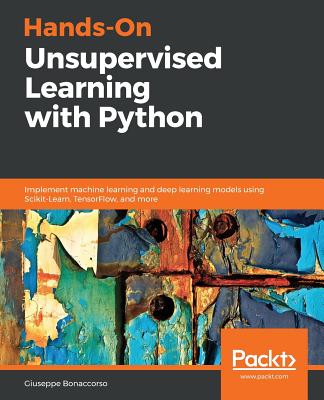Mastering Machine Learning Algorithms: Expert techniques to implement popular machine learning algorithms and fine-tune your models
暫譯: 掌握機器學習演算法:專家技術實現流行的機器學習演算法並微調模型
Giuseppe Bonaccorso
- 出版商: Packt Publishing
- 出版日期: 2018-05-25
- 售價: $1,810
- 貴賓價: 9.5 折 $1,719
- 語言: 英文
- 頁數: 576
- 裝訂: Paperback
- ISBN: 1788621115
- ISBN-13: 9781788621113
-
相關分類:
Machine Learning、Algorithms-data-structures
-
其他版本:
Mastering Machine Learning Algorithms, 2/e (Paperback)
買這商品的人也買了...
-
 基礎資料結構 ─ 使用 C (Fundamentals of Data Structures in C, 2/e)
基礎資料結構 ─ 使用 C (Fundamentals of Data Structures in C, 2/e)$790$750 -
 Python 錦囊妙計, 3/e (Python Cookbook, 3/e)
Python 錦囊妙計, 3/e (Python Cookbook, 3/e)$880$695 -
 流暢的 Python|清晰、簡潔、有效的程式設計 (Fluent Python)
流暢的 Python|清晰、簡潔、有效的程式設計 (Fluent Python)$980$774 -
 TensorFlow + Keras 深度學習人工智慧實務應用
TensorFlow + Keras 深度學習人工智慧實務應用$590$460 -
 $1,088Python Machine Learning, 2/e (Paperback)
$1,088Python Machine Learning, 2/e (Paperback) -
 Deep Learning By Example
Deep Learning By Example$1,660$1,577 -
 $474OpenCV 算法精解:基於 Python 與 C++
$474OpenCV 算法精解:基於 Python 與 C++ -
 Python 入門邁向高手之路王者歸來
Python 入門邁向高手之路王者歸來$699$594 -
 Python 資料運算與分析實戰:一次搞懂 NumPy, SciPy, Matplotlib, Pandas 最強套件
Python 資料運算與分析實戰:一次搞懂 NumPy, SciPy, Matplotlib, Pandas 最強套件$590$502 -
 Deep Learning Essentials: Your hands-on guide to the fundamentals of deep learning and neural network modeling
Deep Learning Essentials: Your hands-on guide to the fundamentals of deep learning and neural network modeling$1,500$1,425
相關主題
商品描述
Explore and master the most important algorithms for solving complex machine learning problems.
Key Features
- Discover high-performing machine learning algorithms and understand how they work in depth.
- One-stop solution to mastering supervised, unsupervised, and semi-supervised machine learning algorithms and their implementation.
- Master concepts related to algorithm tuning, parameter optimization, and more
Book Description
Machine learning is a subset of AI that aims to make modern-day computer systems smarter and more intelligent. The real power of machine learning resides in its algorithms, which make even the most difficult things capable of being handled by machines. However, with the advancement in the technology and requirements of data, machines will have to be smarter than they are today to meet the overwhelming data needs; mastering these algorithms and using them optimally is the need of the hour.
Mastering Machine Learning Algorithms is your complete guide to quickly getting to grips with popular machine learning algorithms. You will be introduced to the most widely used algorithms in supervised, unsupervised, and semi-supervised machine learning, and will learn how to use them in the best possible manner. Ranging from Bayesian models to the MCMC algorithm to Hidden Markov models, this book will teach you how to extract features from your dataset and perform dimensionality reduction by making use of Python-based libraries such as scikit-learn. You will also learn how to use Keras and TensorFlow to train effective neural networks.
If you are looking for a single resource to study, implement, and solve end-to-end machine learning problems and use-cases, this is the book you need.
What you will learn
- Explore how a ML model can be trained, optimized, and evaluated
- Understand how to create and learn static and dynamic probabilistic models
- Successfully cluster high-dimensional data and evaluate model accuracy
- Discover how artificial neural networks work and how to train, optimize, and validate them
- Work with Autoencoders and Generative Adversarial Networks
- Apply label spreading and propagation to large datasets
- Explore the most important Reinforcement Learning techniques
Who This Book Is For
This book is an ideal and relevant source of content for data science professionals who want to delve into complex machine learning algorithms, calibrate models, and improve the predictions of the trained model. A basic knowledge of machine learning is preferred to get the best out of this guide.
Table of Contents
- Machine Learning Model Fundamentals
- Introduction to Semi-Supervised Learning
- Graph-based Semi-Supervised Learning
- Bayesian Networks and Hidden Markov Models
- EM algorithm and applications
- Hebbian Learning
- Advanced Clustering and Feature Extraction
- Ensemble Learning
- Neural Networks for Machine Learning
- Advanced Neural Models
- Auto-Encoders
- Generative Adversarial Networks
- Deep Belief Networks
- Introduction to Reinforcement Learning
- Policy estimation algorithms
商品描述(中文翻譯)
探索並掌握解決複雜機器學習問題的最重要演算法。
主要特點
- 發現高效能的機器學習演算法,深入了解其運作原理。
- 一站式解決方案,掌握監督式、非監督式和半監督式機器學習演算法及其實作。
- 掌握與演算法調整、參數優化等相關的概念。
書籍描述
機器學習是人工智慧(AI)的一個子集,旨在使現代計算機系統更智能、更具智慧。機器學習的真正力量在於其演算法,這些演算法使得即使是最困難的任務也能夠由機器處理。然而,隨著技術的進步和數據需求的增加,機器必須比今天更智能,以滿足龐大的數據需求;掌握這些演算法並最佳化使用它們是當前的迫切需求。
《掌握機器學習演算法》是您快速掌握流行機器學習演算法的完整指南。您將接觸到在監督式、非監督式和半監督式機器學習中最廣泛使用的演算法,並學習如何以最佳方式使用它們。從貝葉斯模型到MCMC演算法,再到隱馬可夫模型,本書將教您如何從數據集中提取特徵,並利用基於Python的庫(如scikit-learn)進行降維。您還將學習如何使用Keras和TensorFlow來訓練有效的神經網絡。
如果您正在尋找一個單一資源來學習、實作並解決端到端的機器學習問題和使用案例,這本書就是您所需要的。
您將學到什麼
- 探索如何訓練、優化和評估機器學習模型
- 了解如何創建和學習靜態及動態的機率模型
- 成功地對高維數據進行聚類並評估模型準確性
- 發現人工神經網絡的運作原理,以及如何訓練、優化和驗證它們
- 使用自編碼器和生成對抗網絡
- 將標籤擴散和傳播應用於大型數據集
- 探索最重要的強化學習技術
本書適合誰
本書是希望深入了解複雜機器學習演算法、校準模型並改善訓練模型預測的數據科學專業人士的理想和相關資源。建議具備基本的機器學習知識,以便從本指南中獲得最佳收益。
目錄
- 機器學習模型基礎
- 半監督學習簡介
- 基於圖的半監督學習
- 貝葉斯網絡和隱馬可夫模型
- EM演算法及其應用
- Hebbian學習
- 進階聚類和特徵提取
- 集成學習
- 機器學習的神經網絡
- 進階神經模型
- 自編碼器
- 生成對抗網絡
- 深度信念網絡
- 強化學習簡介
- 策略估計演算法











